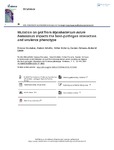Mutation on lysX from Mycobacterium avium hominissuis impacts the host–pathogen interaction and virulence phenotype
Kirubakar, Greana
Schäfer, Hubert
Rickerts, Volker
Schwarz, Carsten
Lewin, Astrid
The lysX gene from Mycobacterium avium hominissuis (MAH) is not only involved in cationic antimicrobial resistance but also regulates metabolic activity. An MAH lysX deficient mutant was shown to exhibit a metabolic shift at the extracellular state preadapting the bacteria to the conditions inside host-cells. It further showed stronger growth in human monocytes. In the present study, the LysX activity on host–pathogen interactions were analyzed. The lysX mutant from MAH proved to be more sensitive toward host-mediated stresses such as reactive oxygen species. Further, the lysX mutant exhibited increased inflammatory response in PBMC and multinucleated giant cell (MGC) formation in human macrophages during infection studies. Coincidentally, the lysX mutant strain revealed to be more reproductive in the Galleria mellonella infection model. Together, these data demonstrate that LysX plays a role in regulating the bacillary load in host organisms and the lack of lysX gene facilitates MAH adaptation to intracellular host-habitat, thereby suggesting an essential role of LysX in the modulation of host–pathogen interaction.

